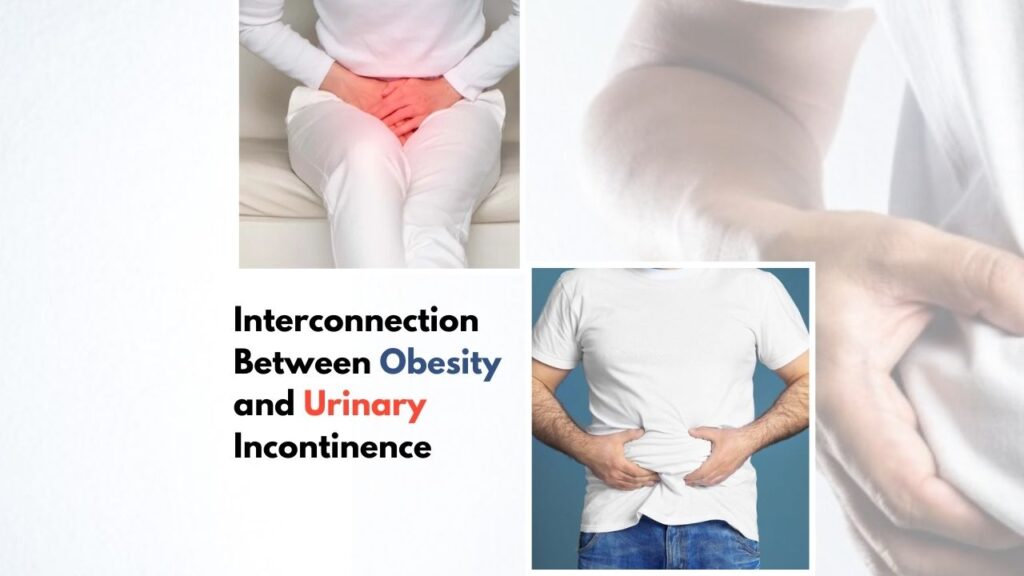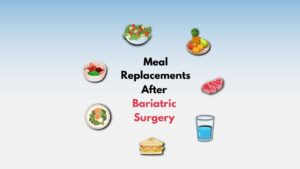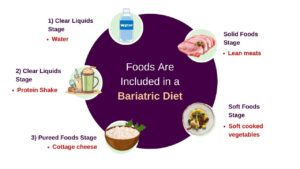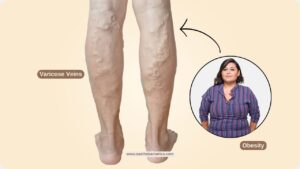Interconnection Between Obesity and Urinary Incontinence

Obesity is a disorder involving excessive body fat that increases the risk of health problems developing from interactive influences of numerous factors like social, behavioural, psychological, metabolic and molecular(genetic). It’s a
medical condition that needs a proper line of treatment.
Body mass index (BMI) is a calculation and screening tool for obesity that takes a person’s weight and height into account to measure body size.
BMI is calculated by using weight in kilograms (kg) divided by
the square of height in meters (m2)
BMI Less than 18.5- Underweight
18.6 to <25-Normal
25.0 to <30-Overweight
30 to <35- Class 1 Obese
35 to <40- Class 2 Obese
40 or higher- Class 3 (Morbid Obesity)
More than 50- Super Obese
Urinary Incontinence -
Urinary incontinence is a term that refers to inability to hold in the urine and suffering from leaking urine especially when sneezing, laughing or any situation that raises the pressure within the abdomen.
Urinary incontinence affects almost 50% of middle-aged and older women worldwide and affects the quality of life severely.
The different types of urinary incontinence are:
Stress Urinary Incontinence: When extra pressure on the bladder or weak pelvic floor muscles causes you to leak urine when sneezing, coughing, laughing, exercising, or lifting heavy objects.
Overactive Bladder (OAB): Feeling like you need to void your bladder more frequently than usual, resulting in peeing more than 8 times in 24 hours.
Overflow Incontinence: Being unable to empty your bladder completely, leading to leftover urine overflowing or dribbling throughout the day.
Mixed Incontinence: Experiencing symptoms of more than one type of incontinence.
Anyone can experience urinary incontinence, from men and women to children
The causes of urinary incontinence usually include:
Weak or damaged pelvic floor muscles.
Hormonal changes experienced during menopause, pregnancy, or menstruation.
Obesity or being overweight.
Certain medications.
Conditions such as autism, Spina bifida, etc.
Nerve damage.
Aging
How Obesity & Urinary Incontinence Are Related
Overactive bladder (OAB) is a chronic condition with many causes. The primary symptoms of OAB include:
Urgency: a sudden, intense need to urinate immediately, which may include urge incontinence (uncontrollable leakage of urine)
Frequency: the need to urinate more often than what is typical for you
Nocturia: the need to urinate one or more times during the night
Link between obesity and OAB symptoms- Excess weight, especially in the abdominal area, is a risk factor for OAB. Likewise, losing weight may help reduce symptoms.
The prevalence of obesity is rising quickly, this means that the number of people experiencing urinary incontinence will likely be on the rise around the same time since it has been proven that obesity is a risk factor for urinary incontinence.
When you are obese, the extra fat on your body specifically in your midsection places extra pressure on your bladder, urethra, and pelvic floor muscles. This is referred to as intra-abdominal pressure and can result in:
Bladder contractions.
A less mobile urethra.
Chronic stretching and strain on pelvic floor muscles.
Whether you experience them alone or together, these results usually lead to stress urinary incontinence, overactive bladder, urge incontinence, or mixed incontinence. This is because:
Bladder contractions are part of what makes you feel the urge to urinate. When your bladder is contracting more than expected due to extra pressure, you may feel the need to void more frequently.
A mobile urethra helps you have urinary continence (bladder control) by opening and closing your urethral sphincter when peeing or holding your pee. When pressure is placed on your pelvic floor muscles, it damages the urethra, making it less able to do its job correctly, leading to unintentional urine leakage.
Your pelvic floor muscles act as a hammock to your internal urinary organs. These muscles hold everything in place and give your core and urinary system strength. The extra pressure from excess weight placed on these muscles causes long-term strain and stretching of the muscles, which causes weakness, leading to pelvic floor disorders.
Weight reduction and urinary incontinence
Weight reduction and urinary incontinence
Exercise
Getting enough exercise is not only good for your overall health, but it can also aid in weight loss.
The adults must get 150 minutes of moderate exercise, such as brisk walking or swimming, every week, with 2 of those days spent doing 150 minutes of muscle strengthening exercises, such as weight lifting.
You can also try small changes, such as taking stairs instead of elevators, walking on breaks at work, or biking instead of driving
Diet
Avoid foods high in saturated fat and sugar and are heavily processed, and remember that you need to burn more calories than you eat in a day.
Choose foods that are good for you, such as:
Fresh fruits and vegetables.
Whole grains.
Lean proteins.
Heart-healthy fish.
Nuts and seeds.
Doctor’s Visits
Don’t miss those follow-up visits with your healthcare provider if you’re trying to manage your weight.
Getting professional advice can help you go about weight loss safely and healthily. Your healthcare provider may also be able to tell you your BMI and recommend weight loss programs, meal recommendations, and exercises that are right for your body.
You may also receive surgical procedure recommendations for weight reduction, such as bariatric surgery if the BMI is 30 or more than 30. Bariatric surgery is the most effective treatment causing weight loss and reducing complications of obesity while simultaneously curing urinary incontinence due to excess weight.
Read also; The Cost of Bariatric Surgery in India
Why We Are?
- Asia's Trusted Bariatric Center
- Centre of Excellence
- Patient Trusted Highly Volume Bariatric Center in Mumbai
- EMI, Cashless & Mediclaim Facilities are Available
- Daily Patients Follow-up after Bariatric Surgery
- Patient Support Group Every Month
- Obesity Awareness Program
- Available with Latest Technologies
- 18+ Experience in Weight Loss Bariatric Surgery
- 300+ Weight Loss Diet Plan & Recipes
- Highly Trained & Experienced Bariatric Nutritionist
- Patient WhatsApp Chat Group
- & Many More
Medically reviewed by Dr. Manish Motwani, Bariatric & Metabolic Laparoscopic Bariatric Surgeon — Curated by Akansha Mishra








